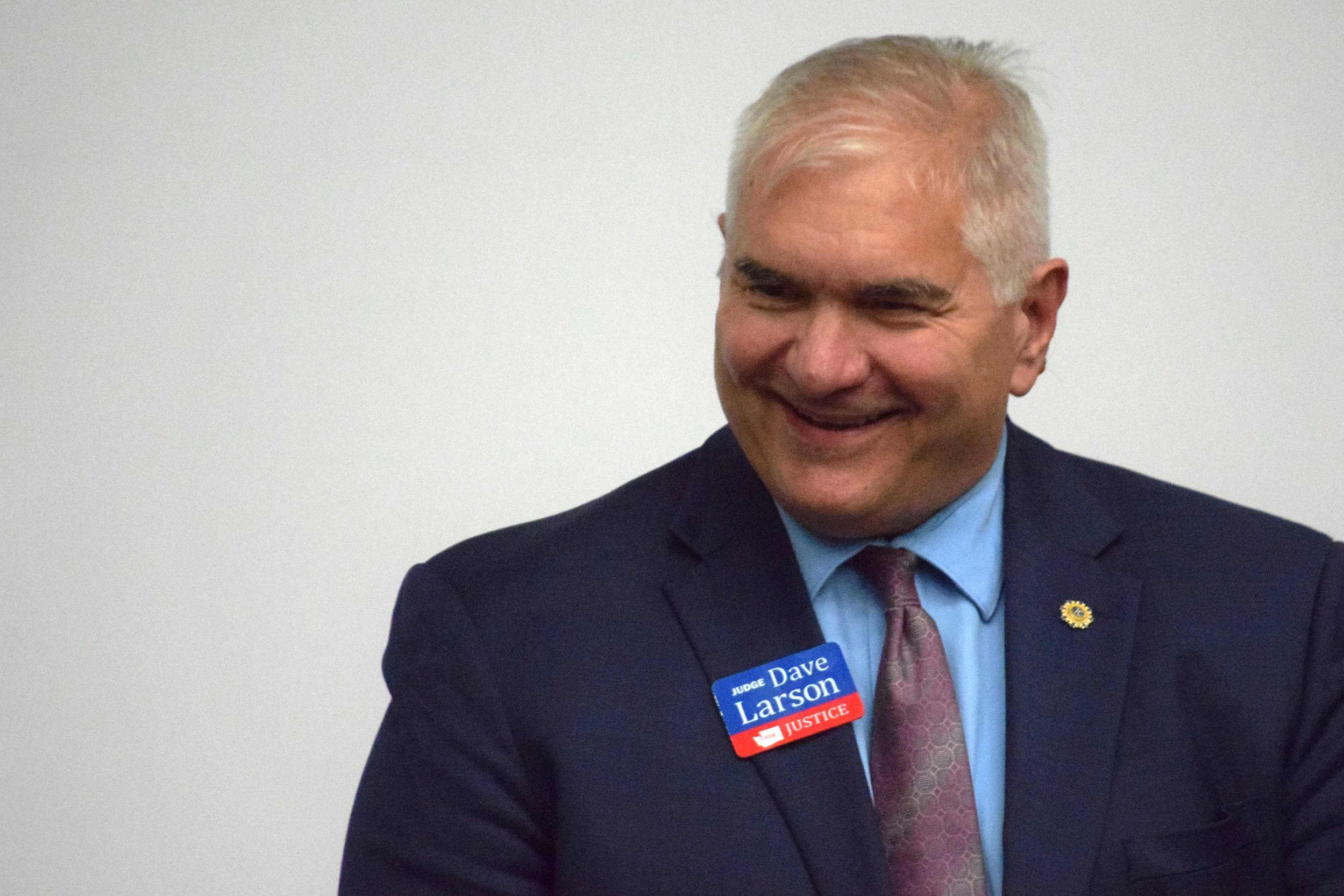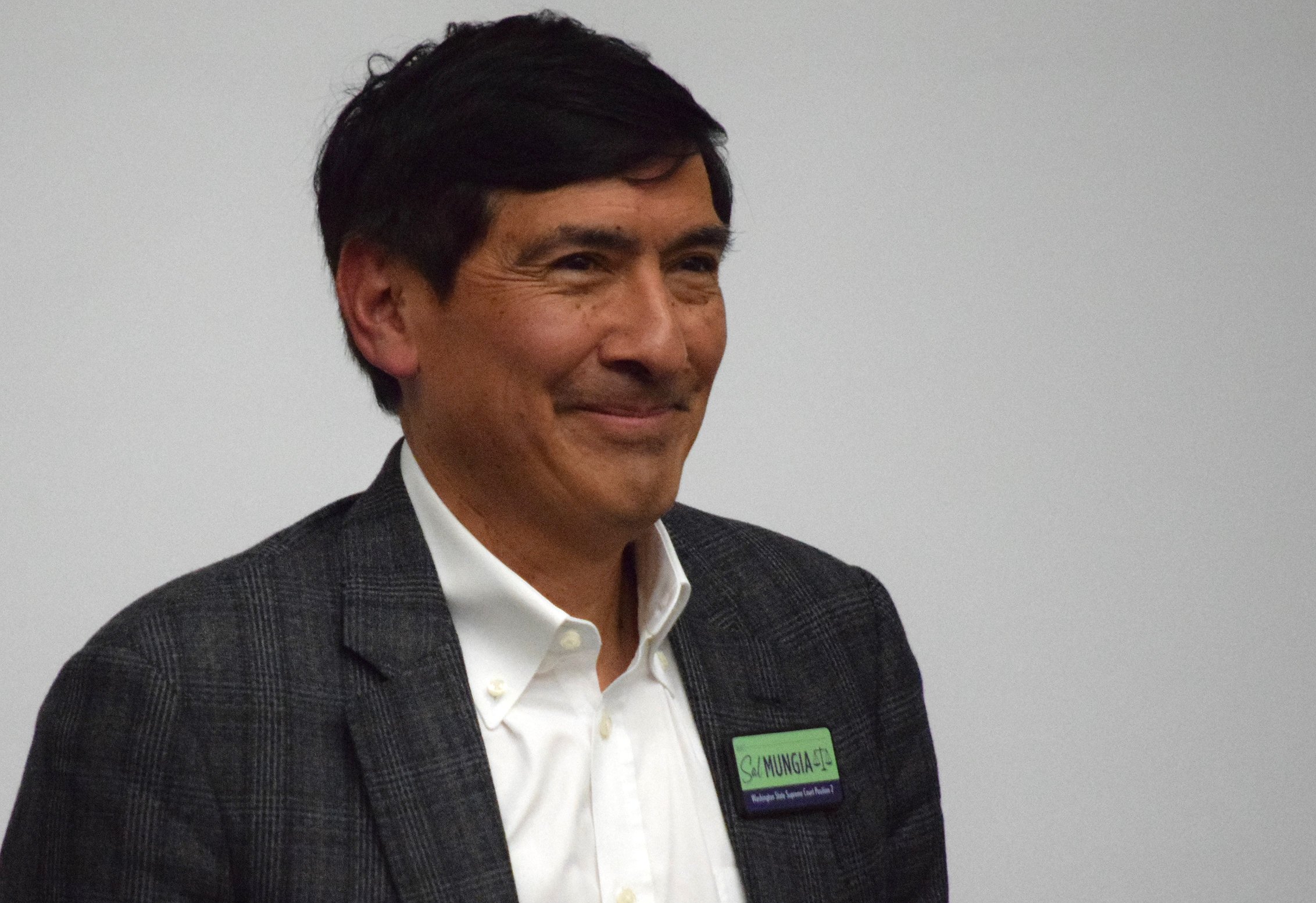WA Supreme Court candidates discuss justice
NANCE BESTON | Hagadone News Network | UPDATED 1 year, 5 months AGO
MATTAWA — A Washington State Supreme Court judge’s seat has opened, and this time, instead of the governor filling the position, the voters will. Candidates Sal Mungia and Dave Larson joined several other candidates for a Sept. 12 forum to discuss various elections on the November ballot.
The forum, hosted by the South Grant County Chamber of Commerce, Wahluke School District and the Columbia Basin Herald was moderated by the paper’s editor, R. Hans “Rob” Miller.
Washington Supreme Court Justice positions are nonpartisan.
Mungia introduced himself saying he has been a lawyer for 40 years and he wants to tell people about the values that he learned from his parents. The first was fairness.
“My mom came from Japan. My dad came from Mexico,” Mungia said. “I saw how they were treated because we didn't have much money and because of the color of their skin. Fairness is very important to me, and I've made that an essential part of my life.”
The second was hard work; Mungia said he thinks he doesn’t work nearly as hard as his parents, and he works “pretty darn hard.” He has had a private practice for 38 years, he said, and is a partner at his law firm.
“I think I work from before sunrise until after sunset,” Mungia said. “But my parents worked harder.”
The third value Mungia stressed was following the rules. Rules are very important to him, he said, and making sure that rules are being followed is equally important.
Larson said he also comes from a working family, and he is very proud of his parents. He said his dad was an airline mechanic and his mom was a homemaker. He said he has been a trial judge for almost 17 years.
“I am in the trenches of all the issues you hear about,” Larson said. “Before becoming a trial judge, I was a trial lawyer for 23 years.”
The last job Larson had as a lawyer was at a large law firm in Seattle doing complex civil litigation cases, he said. He then started as a judge in Federal Way.
“I went in to help try to fix that court and I have been there just under 17 years,” Larson said.
He is looking forward to the opportunity for the voters to be educated on the courts.
“They are very important to our existence, and they’re underestimated down below in the ballot,” Larson said. “But Sal and I hope we can bring some interest to this so that people engage in the process.”
Throughout the forum, both Mungia and Larson showed that they agreed on several issues, though their approaches were different. Miller did not have to enforce the rules of the forum, which included a prohibition on mudslinging, throughout their time on stage.
Juvenile Justice System
Both candidates were asked what the State Supreme Court could do to assist with improving the juvenile justice system.
Larson said the Supreme Court doesn’t make decisions, they just run the courts, create court rules and set the tone for the courts.
“What the Supreme Court can do is be a messenger, in the way we operate juvenile courts,” Larson said. “'We-hope-everybody-turns-out-OK’ kind of approach, and we don't want to detain people, and it's not working out. The Supreme Court could take a better role in educating judges and educating the communities on how we can better approach juvenile justice. Because all those people we don't do (in) the juvenile justice system is going to end up showing up in our adult (court) and affecting our communities.”
Larson said there is a strong link between education and courts; there needs to be a balance between leniency and punishment to the point lives are ruined.
“My motto in my court is, ‘I run a repair shop here,’ and that's the way the court should be, a welcoming place to help people have better lives,” Larson said. “We can do that.”
Mungia said udges don’t make the laws, they enforce the laws the Legislature makes.
“As far as juvenile justice, the courts have to follow that,” Mungia said. “Whether you like those laws or not. That's up for the Legislature and that's their role.”
The state of Washington doesn’t have a unified court system, Mungia explained, meaning the Supreme Court can’t tell superior or district court judges what to do.
“The court can set court rules, but that is a pretty limited method, and certainly can't tell the lower courts how to sentence or what to do with juveniles if they break the law,” Mungia said. “What judges can do, and what I've done as a private citizen, is hopefully try to keep our juveniles out of trouble in the first place,” he said.
Mungia said he started a program nine years ago to improve reading rates in the east side of Tacoma.
“We adopted those kids with our goal (to read) by grade three, because if you can't read by the end of grade three, there's a direct correlation of being incarcerated, and so we worked hard,” Mungia said. “We put books in the school, we put mentors in the school.”
One of his most rewarding days was hearing from a fifth grade teacher that it was the first year that her kids were at grade level and Mungia’s program helped with that, he said.
Improving access to justice
Candidates were also asked about their views on access to justice and legal aid for Washingtonians given the complexity of the justice system.
“Oh my gosh, access to justice is not easy,” Mungia said. “Are you kidding me? It’s very difficult.”
He said he has worked to ensure access to justice by trying to get people a form of representation to give both sides a fair fight.
“If you hire an attorney like me against someone who doesn't have an attorney, it ain't even close to a fair fight,” Mungia said. “So, I spent my career doing pro bono work, representing individuals, representing families who could not afford an attorney.”
Mungia said he has successfully lobbied for additional funding from the state for legal aid programs.
Mungia said he has also worked to help low-income and moderate-means residents get access to legal professionals.
“I was the president of the Washington State Bar Association. We started up a moderate means program that working-class people can get representation at a fairly reasonable cost,” he said.
Larson agreed that access to legal representation is difficult to obtain.
“The justice system should be involved in a way that becomes accessible, inexpensive and easy to operate; right now, we're the opposite,” Larson said. “The reason all that money is needed is because we made this system so complex, so burdensome, so expensive, that the average person can't afford it.”
Courts bully people in the legislature who could influence outcomes, especially in family law, he said. He said family law is a horrible experience, and legal expenses go way up because of the conflict the system itself creates.
“I almost walked away from the legal profession back in 1998 because we became so in love with our rules, and it was causing so much more expense just complying with rules and procedures,” Larson said.
He said that was one of the reasons he was running because he wanted to help simplify things.
“We have to have a system that doesn't need a lot of money poured into it to help people operate,” Larson said. “It needs a system that is designed to do what it's supposed to do. We're supposed to be the peacekeeping branch of the government... We're supposed to solve problems and not create more with our rules and our dogma that we've developed over the years.”
Biggest challenge
The candidates had different opinions when asked what they felt the biggest challenge of being on the Washington Supreme Court would be.
Larson said the biggest challenge is deciding what cases come before the Court. He also wants to make courts more accessible.
“We have an opportunity on our Supreme Court to use the power of that court, to use the bully pulpit, to inspire courts across the state to develop ways to serve people,” Larson said.
Larson said he has tried to model fairness in regard to crime, addiction and mental illness in his courtroom.
He said that the courts need barrier-free access to peer navigation, especially by emphasizing early intervention.
“The idea is, our court system can serve our communities much better, and we need justices on the court to make it a priority,” Larson said.
Larson said the lack of a behavioral health justice commission is an issue. He added that the State v. Blake ruling undermined judges’ ability to deal with drug cases.
Mungia said there are three challenges for any judge. Firstly, make sure to follow the rule of law and not personal beliefs or what the judge wants.
“You have to follow the rule of law,” Mungia said. “You have to do what the federal or the state Constitution tells you to do, whether you like it or not, and you have to put aside your own personal beliefs. I think that is very difficult to do, and you've always just got to be consciously aware of making sure you do that.”
A judge must also collaborate with other judges and legal professionals, Mungia said.
“I think we've lost the art, maybe we've never had it, (of knowing) how to disagree without becoming disagreeable,” Mungia said. “We have different viewpoints. We are stronger where we can bring those different viewpoints together and talk about them in a civil manner to really try to convince someone, not through personal attacks. I love this kind of going back and forth here right now, because we're not attacking anybody, but expressing your views and then really respecting the reviews of someone else.”
Thirdly, Mungia said it’s important not to get lazy.
“We know there are hard-working judges, hard-working legislators, and not-so-hard-working judges, not-so-hard-working legislators,” Mungia said. “I think the same thing about being an attorney every day, I said, ‘I'm the luckiest guy in the world because I'm an attorney.’ I think as a judge, you always must remember that you are serving all the people and that you are so lucky to be in that position.”
Want to watch?
The full forum may be watched at https://bit.ly/2024GCFORUM.
ARTICLES BY NANCE BESTON

Frosty Finds offers appraisals, unique finds Saturday
MOSES LAKE — The Moses Lake Museum & Art Center is inviting the public to its Frosty Finds Flea Market and Appraisal Fair on Saturday, where some appraisal slots remain open for anyone curious about the value or history of their antiques and collectibles.

Army takes custody of Gorge shooting suspect
MOSES LAKE — The Army has taken custody of the soldier accused of killing two people and injuring several others during the 2023 Beyond Wonderland music festival shooting at the Gorge Amphitheatre and has now charged him under military law.

Columbia Basin Hospital board seeks applicants
EPHRATA — Columbia Basin Hospital is seeking applicants to fill a vacant seat on the Board of Commissioners for Public Hospital District No. 3.





